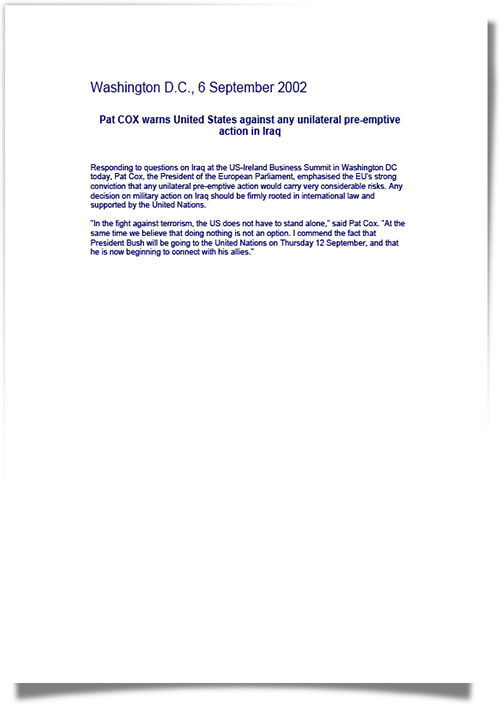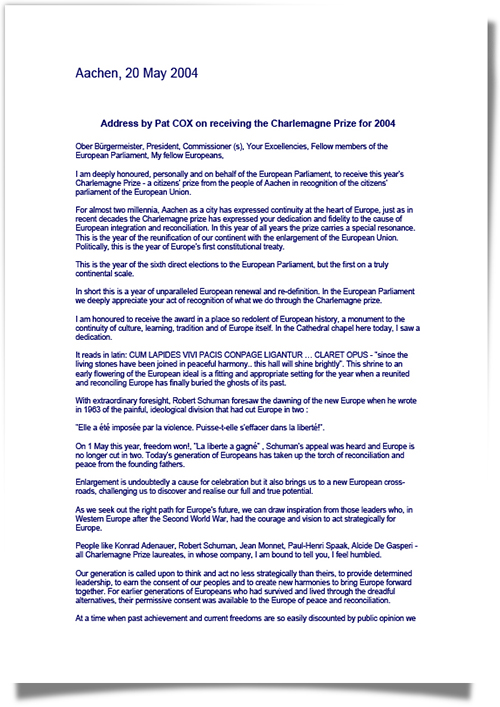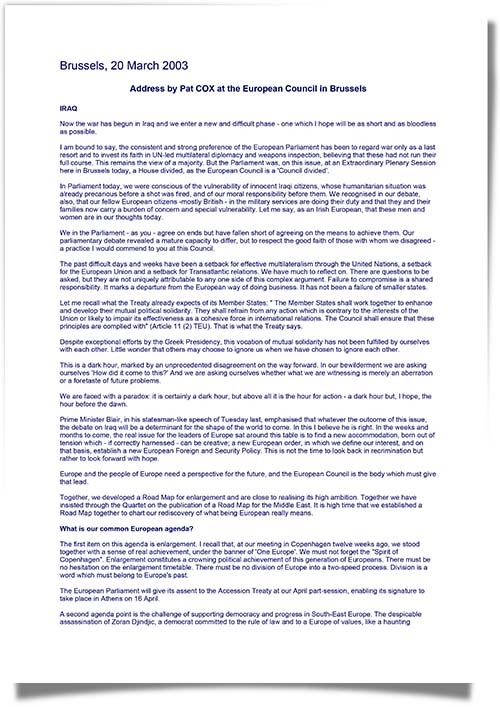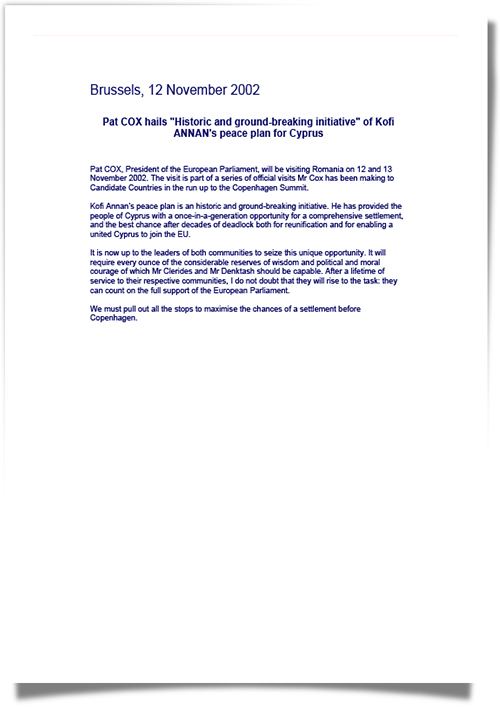EU External Relations
Iraq and relations with the US
After the attacks of 11 September 2001 and the war in Afghanistan, Iraq's aggression against Kuwait and failure to comply with previous resolutions encouraged the UN Security Council to consider Iraq as a threat to international peace and security.
Thus, UN Security Council Resolution 1441 of 8 November 2002 on Iraq required Baghdad to comply with UN demands, i.e. to disarm itself and to provide verifiable evidence that it had done so.
Pat Cox then asked for a special EU summit to be held on Iraq. An extraordinary European Council was thus held in Brussels on 17 February 2003. Cox gave an address outlining the Parliament’s position:
"Iraq must disarm.
We support the work of the weapons inspectors.
We are opposed to unilateral pre-emptive military action.
We insist on respect for multilateralism through the UN process.
And we seek the maximum expression of Europe's common view."
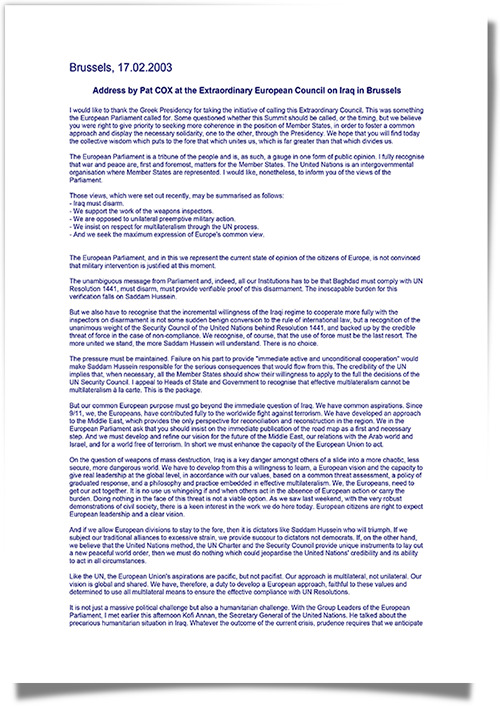
Address: Extraordinary European Council on Iraq (PDF), Brussels, 17 February 2003.
He also pointed out that the European Parliament was not convinced of the advisability of military intervention at this stage. The Iraqi regime was cooperating with the weapons inspectors and appeared to be complying with the provisions of UN Security Council Resolution 1441, whether out of respect for international law or out of fear of the military consequences if it failed to satisfy the conditions laid down in the Resolution.
Pat Cox felt the need to show a Europe that was united, and capable of applying sanctions.
He then agreed to devote an extraordinary sitting of the European Parliament to the situation in Iraq. This took place on 20 March 2003. On the same day, the U.S. unilaterally decided to go to war without the approval of the UN Security Council.
"Last week when we debated the Iraqi crisis in this House we invested our hopes in diplomacy and inspection. Now the situation has changed and changed utterly"
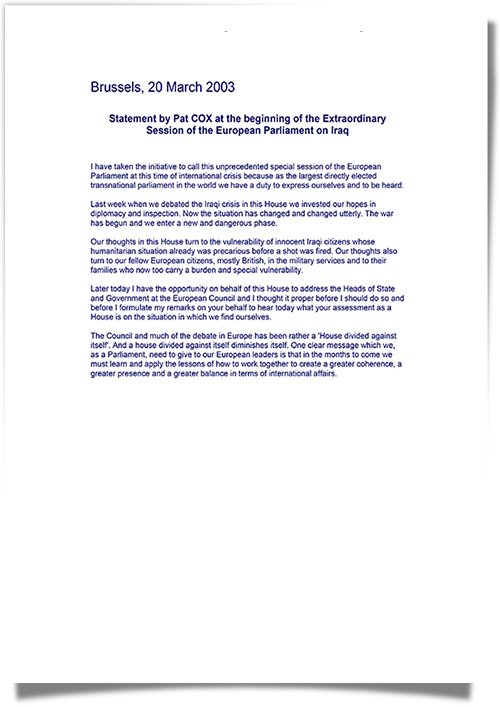
Statement by Pat Cox (PDF): beginning of the Extraordinary Session of the European Parliament on Iraq, Brussels, 20 March 2003
The war in Iraq divided Europe, creating discord between those countries that were committed to the war and those opposed to US armed intervention. Thus, the problem of the war in Iraq clearly highlighted existing divisions within the EU and the EU's inability to respond rapidly and its relative lack of weight in international policy-making. At the Brussels European Council, Pat Cox reiterated his disappointment at the attitude of the US.
Amidst this crisis, the International Criminal Court, whose mandate is to prosecute individuals accused of genocide, war crimes or crimes against humanity, was inaugurated on 1 March 2003 (download his press release on the inauguration of the ICC - PDF). In fact the ICC, a permanent body, whose scope extends to all States that have ratified the Rome Statute, is not recognized by the United States. Touching on this subject in his end-of-mandate address, Cox concluded with the following statement:
"The difficult days and weeks of 2003, when we lived through the European Union's 'Iraqi crisis', amounted to a setback for effective multilateralism through the United Nations, a setback for the European Union and a setback for Transatlantic relations."
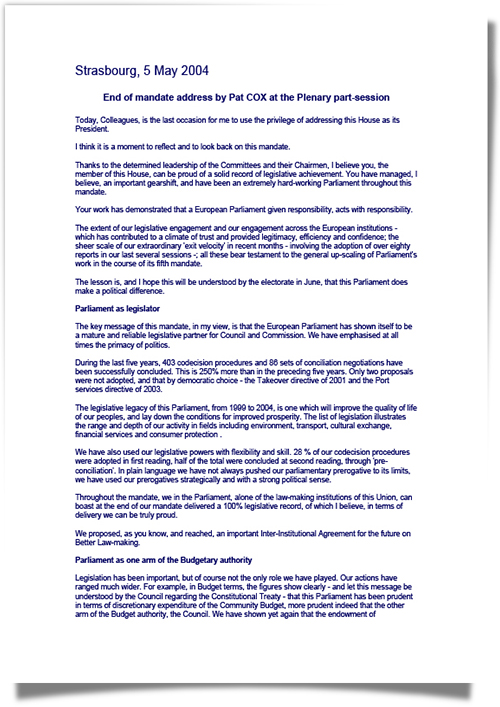
The western Balkans
Outreach with Balkan states was another dimension of Cox’s external policy. While accession talks and interparliamentary dialogues with Balkan states are still ongoing, already during his presidency Cox visited a number of states, and affirmed that “the future of the Western Balkans is in the European Union and the European Parliament will play its part to bring that about” (read the address by Pat Cox to the EU-Western Balkans Summit in Thessaloniki - PDF). In an address to the Council towards the end of his term, he repeated this sentiment, and affirmed the important role of Parliament particularly in the Croatian integration process:
“Parliament very much welcomes the idea of opening the negotiations with Croatia early in 2005 [...] the moving to the next stage for Croatia's accession should act as a spur for the new European perspective for the Western Balkans region.”
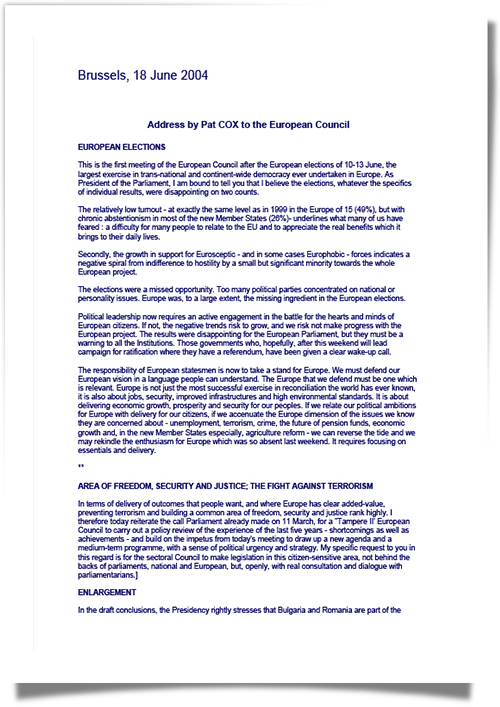
Cyprus
Since 2002, Cox expressed the hope that the UN plan for Cyprus, drawn up by Kofi Annan, would open the way to a comprehensive settlement and enable reunification to take place. This plan involved the creation of a united republic of Cyprus based on a federal system in which the two communities would be represented. However, when this plan was put to a referendum in both parts of the island on 24 April 2004, the Greek Cypriots overwhelmingly rejected it. The Annan plan was thus unable to be implemented.
"The people have spoken loud enough to be heard in Brussels, and I hope, in other centres of authority. The people want a settlement and the people want a settlement now."
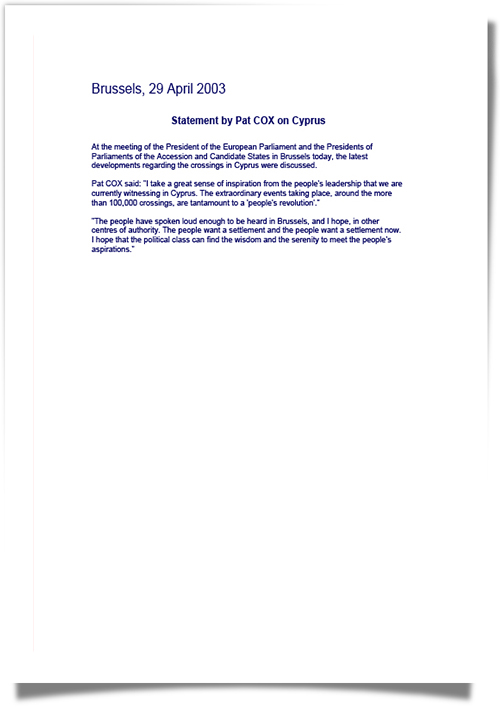
Madrid terrorist attack
On 11 March 2004, ten explosive devices were detonated on four commuter trains in Madrid, killing 191 people and wounding more than 1,800.
"Let's share more intelligence and find the political will tomorrow to engage in practical cooperation."
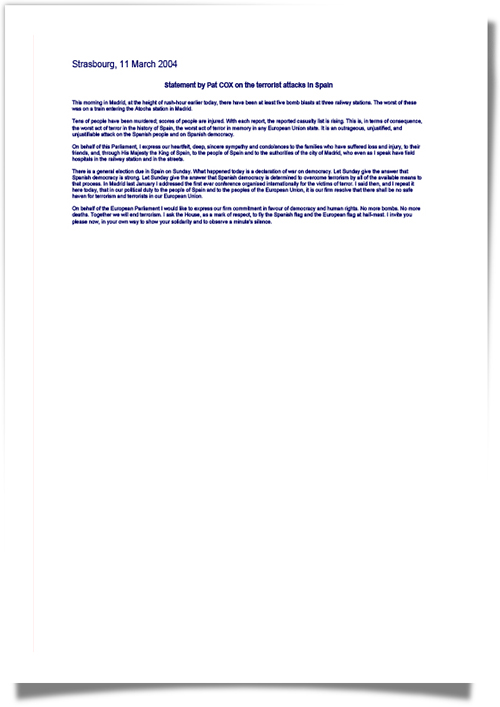
In January 2004 the first International Congress for Victims of Terrorism was held. On this occasion, the European Parliament reiterated its appeal to take all necessary measures to ensure the closest possible cooperation of all security services in a global struggle against terrorism. Furthermore Cox insisted that, once the agreements had been adopted, it was necessary to ensure that governments effectively implemented these decisions.
For Pat Cox, the European Parliament had failed to honour all the commitments it had made after 11 September 2001. The fight against terrorism has been hampered because the relevant EU legislation had not been fully transposed into the national laws of Member States.
At the European Council in Brussels on 25 and 26 March 2004, a working session was organised devoted to terrorism. Thus, in the wake of the Madrid bombings, Heads of State and Government adopted a joint declaration on the fight against terrorism in which the European Council called for the development of a long-term strategy to address the factors that contributed to terrorism. The Council also urged the adoption before 1 May 2004 of the directive on compensation for victims of crime.
